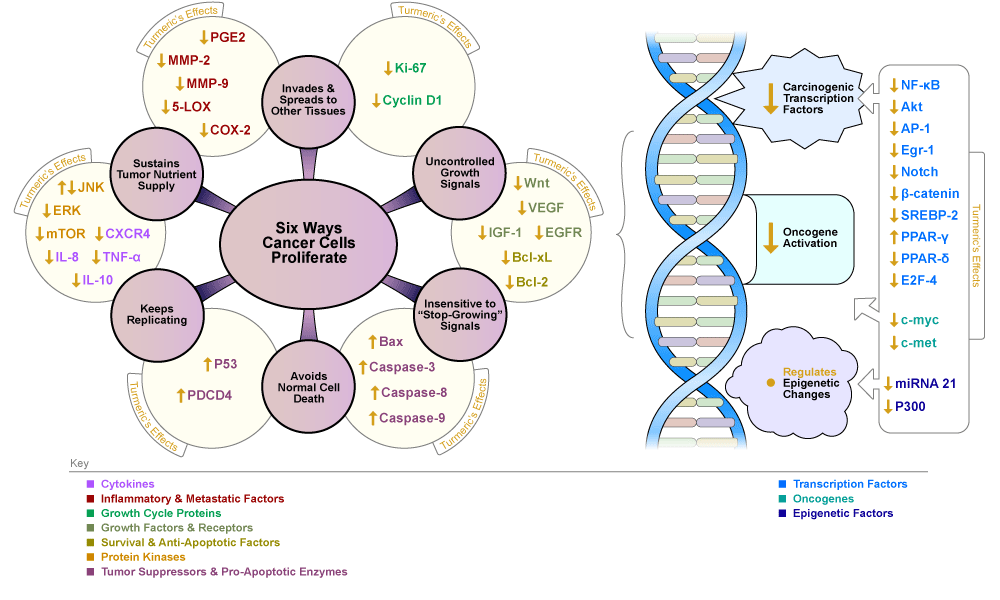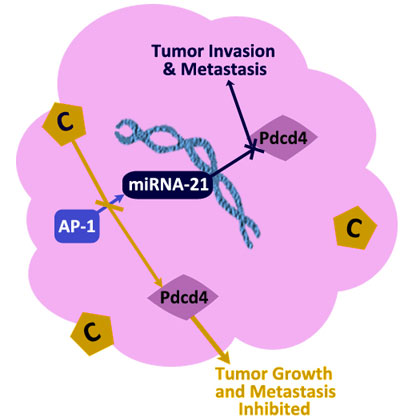Treating Colorectal Cancer with Turmeric

The average 5-year survival rate is barely above 60% (for all stages of colorectal cancer). In most cases death occurs when the primary tumors spread to other areas of the body. Finding treatments that can prevent or block tumor activity that promotes metastasis could improve overall survival rates from this common cancer. (vi.240)
Turmeric compounds target many of the same factors as the chemotherapy drugs approved by the FDA for treating colorectal cancer — especially curcumin. They can also act as antioxidants or pro-oxidants, depending on circumstances. For example, curcumin can generate free radicals on its own or boost this effect in chemotherapy drugs to kill colorectal cancer cells. On the other hand, turmeric and many of its compounds are antioxidants that quench free radicals and protect healthy tissue from chemo damage. In animal and human research, turmeric compounds inhibit inflammatory enzymes, growth factors, and other proteins that promote colorectal tumor progression: (vi.2, 11, 59, 67, 81, 88, 134, 171, 174, 180, 275, 277, 289-290, 293)

Figure VI.17: How Turmeric's Curcumin Compounds Stop Colorectal Cancer Cells
Clinical Evidence of Benefit
Clinical study results in people provide promising evidence of turmeric and curcumin's cancer fighting effects in patients with colorectal cancer. Curcumin could also help control symptoms (such as weight loss) in colon cancer patients. (vi.134)

| CURCUMIN OR TURMERIC DOSAGE | RESULTS |
|---|---|
CURCUMIN 0.45-3.6 g/day for a week prior to surgery |
At the highest dosage, in only one week the turmeric compound reduced 58% of DNA lesions caused by free-radicals in patients with colorectal cancer. Curcumin did not cause any changes in healthy tissue. (vi.294) |
|
TURMERIC EXTRACT (Curcuma longa and C. xanthorrhiza) 440-2200 mg/day for 120 days |
15 patients with colorectal cancer that had spread to the other organs were involved in the study. All had been treated with surgery and chemotherapy and/or radiation but were no longer responding to conventional treatments. (vi.272) Study participants were given daily turmeric supplements until there were signs of tumor progression. Each dose contained 40-200 mg of curcumin compounds and 200-2000 mg of essential oils from turmeric. (vi.272) 3 patients had stable disease with no cancer growth for 3 months and 2 patients for 4 months. In a 6th patient, tumor growth in the colon slowed, with no effect on the metastasized tumors in the liver. Researchers suggested turmeric may have been responsible for inhibiting tumor progression in one of the patients who had liver metastasis. There were no toxic side effects at any of the dosage levels. (vi.272) |
CURCUMIN 0.45-3.6 mg/day |
Turmeric's curcumin compounds blocked tumor-promoting inflammatory proteins in 15 patients with advanced colorectal cancer. Preclinical studies show that the turmeric compound inhibits EGFR, a protein associated with colorectal tumor growth and progression. While this clinical trial did not directly measure curcumin's effects on EGFR, it did show that 2 of the 15 patients (13%) had stable disease for 4 or more months. The doses taken were 1000 and 2000 mg/day. (vi.276) |
|
CURCUMIN 360 mg - |
In a clinical trial involving 126 patients newly diagnosed with colorectal cancer, researchers randomly assigned half of them to take curcumin prior to surgical removal of tumors and follow-up treatment (radiotherapy, chemotherapy, or both). Those who took curcumin experienced beneficial weight gain and had higher levels of dead tumor cells than those who received placebo. (vi.252, 295-296) |
Epigenetic Activity Could Explain Turmeric's Antitumor Effects in Colon Cancer
Recent research suggests that one of the ways compounds such as curcumin in turmeric can work against cancer despite low concentrations in blood and tissue is by influencing epigenetic activity of microRNAs (miRNAs). These tiny molecules work to control how RNA (DNA's messenger molecules) carries out messages to the cell to produce proteins. In cancer, over- or under-expression of miRNAs can promote or inhibit both antitumor and carcinogenic proteins. (vi.133)
One example of curcumin's epigenetic effects specific to colorectal cancer was demonstrated in a recently published animal study. The turmeric compound stopped miRNA-21 from targeting a protein that suppresses colorectal tumors. It did so by inhibiting a transcription factor that promotes production of miRNA-21: (vi.133)

Figure VI.18: Epigenetic Effects of Turmeric's Curcumin Helps Stop Colon Cancer
Join the 1000s of People Who Are Discovering the Benefits of Turmeric.

Healthceuticals® Turmeric Curcumin Complex
100% Certified
Organic ingredients
- Organic Turmeric Extract - standardized to 95% curcuminoids.
- Organic Whole Turmeric - provides full spectrum antioxidant, anti-inflammatory turmeric benefits, including turmerones and numerous vitamins, minerals, and phytonutrients
- Organic Black Pepper Extract - standardized to 95% piperine; dramatically enhances bioavailablity.
- Organic Phospholipids - markedly improve absorption.
- Organic Ginger - works synergistically with turmeric to provide more powerful benefits.
- Absolutely FREE of potentially harmful additives and fillers such as magnesium stearate.




